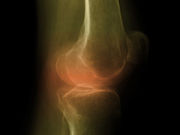For women, but not men, knee extensor strength at time 0 significantly lower in patients than controls
TUESDAY, May 31, 2016 (HealthDay News) — For women, but not men, thigh muscle strength predicts the risk of undergoing knee replacement surgery, according to a study published in the May issue of Arthritis & Rheumatology.
Adam G. Culvenor, Ph.D., from the Paracelsus Medical University in Salzburg, Austria, and colleagues examined whether thigh muscle strength predicts the risk of undergoing knee replacement surgery. Participants in the Osteoarthritis Initiative study who had received a knee replacement were matched with control subjects who did not receive a knee replacement in a 1:1 ratio. Data were included for 136 participants who had received a knee replacement during follow-up and had a matched control.
The researchers found that, compared with controls, female patients had significantly lower knee extensor strength at time 0 (examination prior to knee replacement; P < 0.001; pain-adjusted odds ratio, 1.72); no significant difference was seen for men. Similar results were seen for knee flexor strength at time 0, and for longitudinal change in extensor and flexor strength between time −2 (two years prior to time 0) and time 0. The risk of undergoing knee replacement surgery was not predicted by thigh muscle strength at time −2 or time −4, or by the change between time −4 and −2.
“The results of this study may identify a window during which the risk of undergoing knee replacement surgery in women can be modified,” the authors write.
Several authors disclosed financial ties to the medical device and pharmaceutical industries; the Osteoarthritis Initiative was partially funded by pharmaceutical companies.
Copyright © 2016 HealthDay. All rights reserved.








